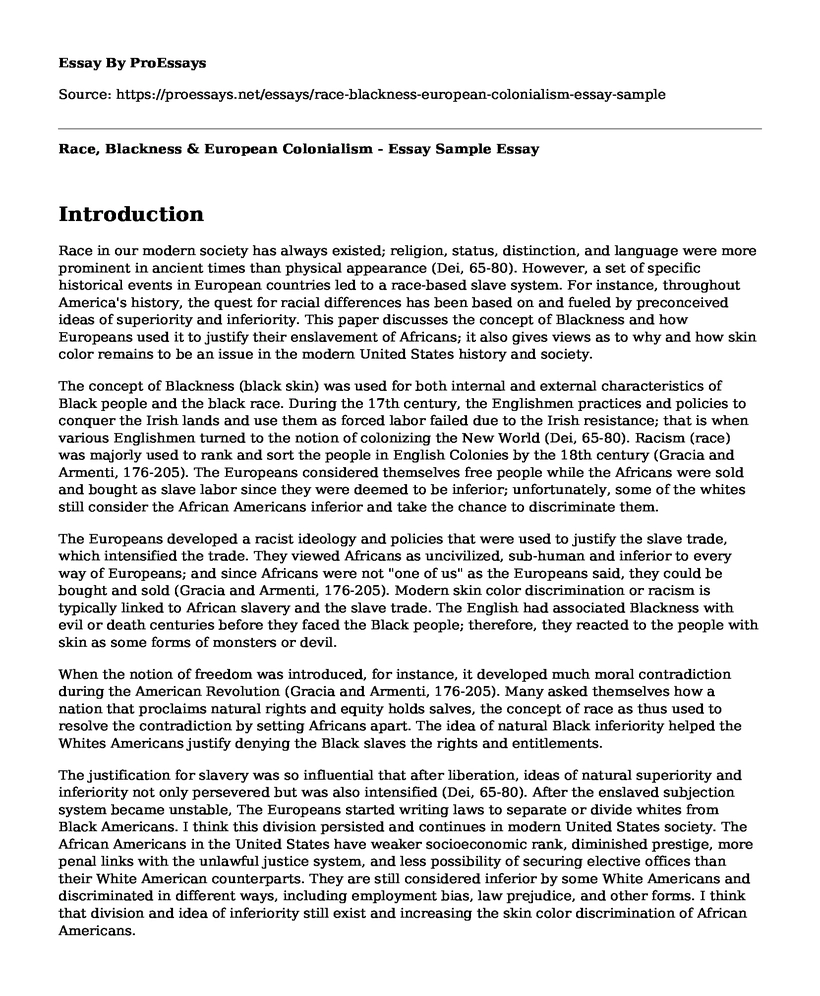Introduction
Race in our modern society has always existed; religion, status, distinction, and language were more prominent in ancient times than physical appearance (Dei, 65-80). However, a set of specific historical events in European countries led to a race-based slave system. For instance, throughout America's history, the quest for racial differences has been based on and fueled by preconceived ideas of superiority and inferiority. This paper discusses the concept of Blackness and how Europeans used it to justify their enslavement of Africans; it also gives views as to why and how skin color remains to be an issue in the modern United States history and society.
The concept of Blackness (black skin) was used for both internal and external characteristics of Black people and the black race. During the 17th century, the Englishmen practices and policies to conquer the Irish lands and use them as forced labor failed due to the Irish resistance; that is when various Englishmen turned to the notion of colonizing the New World (Dei, 65-80). Racism (race) was majorly used to rank and sort the people in English Colonies by the 18th century (Gracia and Armenti, 176-205). The Europeans considered themselves free people while the Africans were sold and bought as slave labor since they were deemed to be inferior; unfortunately, some of the whites still consider the African Americans inferior and take the chance to discriminate them.
The Europeans developed a racist ideology and policies that were used to justify the slave trade, which intensified the trade. They viewed Africans as uncivilized, sub-human and inferior to every way of Europeans; and since Africans were not "one of us" as the Europeans said, they could be bought and sold (Gracia and Armenti, 176-205). Modern skin color discrimination or racism is typically linked to African slavery and the slave trade. The English had associated Blackness with evil or death centuries before they faced the Black people; therefore, they reacted to the people with skin as some forms of monsters or devil.
When the notion of freedom was introduced, for instance, it developed much moral contradiction during the American Revolution (Gracia and Armenti, 176-205). Many asked themselves how a nation that proclaims natural rights and equity holds salves, the concept of race as thus used to resolve the contradiction by setting Africans apart. The idea of natural Black inferiority helped the Whites Americans justify denying the Black slaves the rights and entitlements.
The justification for slavery was so influential that after liberation, ideas of natural superiority and inferiority not only persevered but was also intensified (Dei, 65-80). After the enslaved subjection system became unstable, The Europeans started writing laws to separate or divide whites from Black Americans. I think this division persisted and continues in modern United States society. The African Americans in the United States have weaker socioeconomic rank, diminished prestige, more penal links with the unlawful justice system, and less possibility of securing elective offices than their White American counterparts. They are still considered inferior by some White Americans and discriminated in different ways, including employment bias, law prejudice, and other forms. I think that division and idea of inferiority still exist and increasing the skin color discrimination of African Americans.
Works Cited
Dei, George J. Sefa. "Reframing blackness, anti-blackness, and decoloniality." Reframing Blackness and Black Solidarities through Anti-colonial and Decolonial Prisms. Springer, Cham, 2017. 65-80. https://link.springer.com/chapter/10.1007/978-3-319-53079-6_3
Gracia, Nahir I. Otaño, and Daniel Armenti. "Constructing prejudice in the Middle Ages and the repercussions of racism today." Medieval Feminist Forum. Vol. 53. No. 1. 2017, pp. 176-205. https://ir.uiowa.edu/mff/vol53/iss1/11/
Cite this page
Race, Blackness & European Colonialism - Essay Sample. (2023, Aug 26). Retrieved from https://proessays.net/essays/race-blackness-european-colonialism-essay-sample
If you are the original author of this essay and no longer wish to have it published on the ProEssays website, please click below to request its removal:
- Comparative Analysis of Sociological and Cultural Impact of Tourism on Communities
- Game Changer Identity: Toussaint's Last Words
- Ethics Review: Bioethicists and Ethical Principles Paper Example
- White Rabbit Radio Hate Group Paper Example
- Essay Sample on Unsettled World
- Article Analysis Essay on City of Women
- Essay Example on Latino Students: Changing Lives Through Agency Efforts







